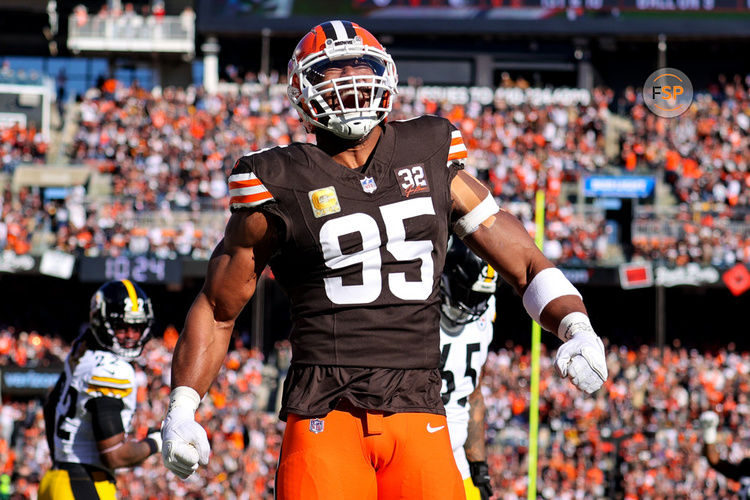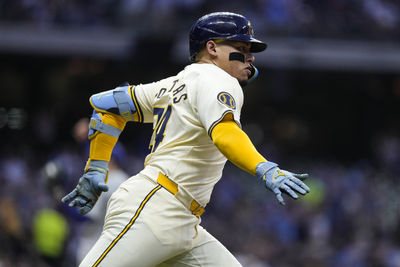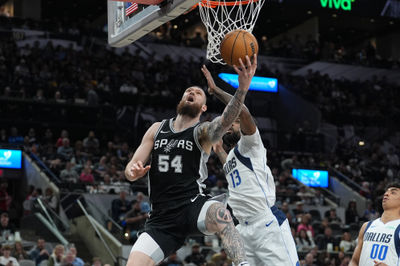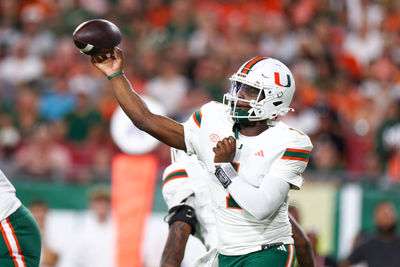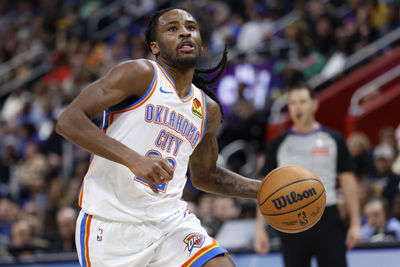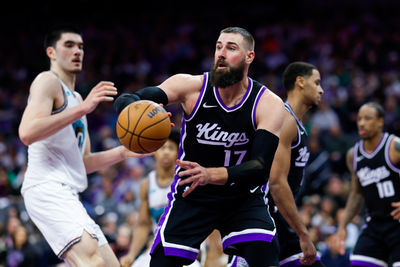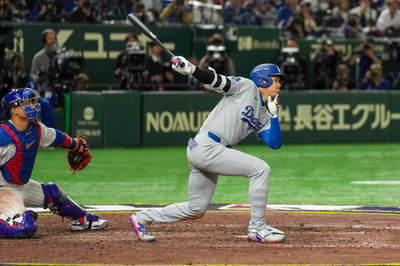What Would it Take for a Non-Quarterback to Win MVP: Paths for Christian McCaffrey, Tyreek Hill, Myles Garrett and More
A look at each position in football and what it would take for a player to conceivably take home the award mostly reserved for quarterbacks: Most Valuable Player.
The NFL MVP award is similar to the biggest contracts in the league: They mostly go to quarterbacks. I recently went through each presumed starting quarterback heading into 2024 and their listed odds for MVP, ultimately landing on Kyler Murray as my best bet.
That doesn’t mean he’s most likely to win, but he is the guy I like best from a value standpoint, including the return, his skill and the team situation. There was a reason I only focused on quarterbacks: no player at another position has won the award since 2012, and only three non-quarterbacks have won the award since 2001.
What would it take for another position to win Most Valuable Player? Let’s go through each position/player type and look at what it might take for a guy to garner real MVP buzz. Past winners are listed, and we’ll use them as examples when applicable.
We’ll start with the positions that probably won’t ever win the award in the foreseeable future and work through the skill positions and defensive players.
Not going to happen
There are a few positions that will never garner MVP votes because of a lack of stats and/or perceived value versus players at other spots. There was one oddball MVP winner in the early 80s, but that is a major exception to the rule.
Kicker
- Mark Moseley – 1982
No kicker will ever win MVP again. This was a nine-game season because of a strike, so no running backs, receivers, or quarterbacks were able to hit big round numbers.
We calculate value with so many advanced stats now that we can compare players at different positions more effectively. Kickers are nowhere close to as valuable as guys at other positions. There’s no serious argument that a kicker should even be considered for this award.
Offensive Linemen
Advanced stats might help O-linemen more than any other position. The only counting stat that really gets attributed to the guys up front is how many sacks they allow; the lack of a negative doesn’t mean anything close to accumulating positive numbers.
Even with the advances in how we view non-skill players, the hurdle is way too big for any offensive lineman to garner any real support, as his teammates who touch the ball will always get more credit.
Defensive Linemen/Linebacker
With these two positions, I am excluding anyone who primarily rushes the passer (we will talk about those guys later). This is more about your defensive tackles and ends who play against the run and true linebackers who play the middle of the field on the second level.
Even if they are elite run defenders, these linemen are never going to get the attention of guys who rack up sacks. Other than creating turnovers, the best thing a defensive player can do is take down the quarterback, and other linemen can’t make up that difference.
Linebackers, on the other hand, accumulate numbers as much or more than any other defensive player. The problem is that generally comes in the form of tackles which aren’t nearly as impactful as sacks and interceptions. For a true linebacker to even sniff the MVP conversation, he would probably have to lead the league in interceptions and/or forced fumbles while wrecking offensive game plans on one of the best defenses in the league.
A history of winners
Running Back
- Adrian Peterson – 2012
- LaDainian Tomlinson – 2006
- Shaun Alexander – 2005
- Marshall Faulk – 2000
- Terrell Davis – 1998
- Barry Sanders – 1997 (tied with Brett Favre)
- Emmitt Smith – 1993
- Thurman Thomas – 1991
- Marcus Allen – 1985
- Earl Campbell – 1979
- Walter Payton – 1977
- O.J. Simpson – 1973
- Larry Brown – 1972
- Jim Brown – 1965, 1958, 1957
- Jim Taylor - 1962
This is where most non-quarterback MVPs have come from. The league was different when a lot of these guys won. Anyone before 2000 was operating in an NFL in which running backs were often critical to the offensive gameplan, and teams without a great back were viewed as seriously lacking.
Alexander and Peterson followed the same path, producing most of their value on the ground and topping 400 receiving yards only once apiece in 24 combined seasons. These guys fit the Jim Brown and Earl Campbell archetype of being invaluable parts of the roster while taking handoffs.
Tomlinson produced a little more as a receiver, topping out at 100 receptions and 725 yards in 2003. When he won the MVP in 2006, it was much more about his 1,815 rushing yards and 28 rushing touchdowns, breaking the league record with the latter. He did have 56 receptions for 508 yards (second most of his career), but Tomlinson’s dominance running the ball and getting in the end zone are the reasons he stood out.
Faulk best exemplifies the most valuable back in 2024, the guy who can get out in the passing game and be a real threat, adding another weapon for his QB. In 30 games over his first two years with the Rams, Faulk combined for 2,740 rushing yards and 1,878 receiving yards. His yardage was actually better in both areas in 1999, but he won the MVP in 2000 because he got into the end zone 26 total times versus just 12 in ’99.
For any back to even be considered for the award, he would have to hit 2,000 rushing yards (like Peterson did in 2012) or be a primary receiver on his team. Christian McCaffrey is the most obvious current example, working as maybe the best runner and receiver among all backs.
McCaffrey received some down-ballot MVP votes last season but no first-place votes. He led all backs in rushing yards and total yards and was second in receiving yards. Over 2,000 total yards and 21 touchdowns didn’t put him seriously in the race to win (though he did finish third).
Beneficiaries of the modern league
Wide Receiver
Despite no receiver ever taking home MVP, I feel like a winner from this position is more likely than a running back in today’s NFL. It’s a passing league: two-thirds of all yards have come through the passing game in each of the previous five seasons.
While that naturally boosts the odds of quarterbacks winning, a receiver could stand out by hitting a few magic numbers. Tyreek Hill was on the hunt for 2,000 yards last season before injuries slowed him down toward the end of the year. His 1,799 receiving yards and 13 receiving touchdowns, both the most in the league, got him a sixth-place MVP finish with no first-place votes.
Reaching 2,000 receiving yards, something no receiver has ever done, would be a great start for any MVP hopeful. Racking up touchdowns has also proven to catch the eye of voters, so approaching the 23 touchdowns Randy Moss hit in 2007 to set the record would be another path.
More realistically, a combination of the two would probably be needed to put a receiver in the catbird seat. Cooper Kupp had 145 receptions for 1,947 yards and 16 touchdowns in 2021; he received one first-place vote (though his quarterback didn’t get a vote, which it would likely take for any WR to win).
Tight End
Any tight end hoping to make a case would have to be the true WR1 on his team, the way Travis Kelce has recently. It can’t just be a dude racking up touchdowns; Rob Gronkowski never received even one MVP vote and neither has Kelce.
For a tight end to get real support, he would have to lead the league in touchdowns while approaching 1,500 yards, a mark no tight end has ever reached (Kelce was closest with 1,416 in 2020). To actually win, that tight end would have to hit top wide receiver numbers, showing out like no TE has ever come close to in a season.
Defensive Players
- Lawrence Taylor – 1986
- Alan Page – 1971
Only two defensive players have won this award, and it’s unlikely to happen in such an offensive league. Taylor is often thought of as the best defensive player of all time. If a player on that side of the ball was going to take home the award, it’s right that Taylor was the guy.
Page was a prominent member of Minnesota’s Purple People Eaters in the ‘60s and ‘70s and stood out among the crowd in 1971. Defensive stats back then are very spotty, but he has been credited with 109 tackles, 9 sacks, three fumble recoveries and two safeties, one of which came on a blocked punt.
Page didn’t hit a single big number the way Taylor did when he led the league with 20.5 sacks in '86, but he was seen as the most impactful player on a team that tied for the best record in football.
Pass Rusher
This is where a defensive MVP will likely come from if it ever happens again. I can’t say it enough: sacks are the most important defensive stat that a player can accumulate unless he starts breaking turnover records.
The MVP voting changed in 2022 so that voters submitted a list of five names when previously each voter just picked one guy as their MVP. Nick Bosa, Micah Parsons and Myles Garrett have all received down-ballot votes in those two seasons. The last defensive player to get a first-place vote was J.J. Watt in 2014, when he got 13 of 50 votes, finishing second to Aaron Rodgers (31 votes).
Watt had 20.5 sacks, a league leading 29 tackles for loss, 10 batted passes, four forced fumbles, an interception returned for a touchdown and one of his five fumble recoveries returned for a touchdown. He even threw in a safety for good measure.
That’s a tremendous line and earned Watt a unanimous Defensive Player of the Year. A defensive guy winning the MVP would almost certainly have to match Watt’s feat of getting every first-place vote for the defensive award. He would also have to hit one really big number (like a record 23 sacks) or stuff the stat sheet like Watt did, particularly forcing fumbles.
Defensive Back
This player would almost certainly have to lead the league in interceptions and/or break Night Train Lane’s record of 14. Safeties have a chance to stuff the stat sheet with the most opportunities for combined tackles, sacks, interceptions and passes defended. The only safeties in the last 40 years to win Defensive Player of the Year were Troy Polamalu and Ed Reed, super-duper-stars; no player appears on that level right now.
Cornerbacks are the other group most helped by the progression of advanced stats. We could see when a player shut down an entire side of the field in the past, like Darrelle Revis, but now we can quote the percentage of snaps that a corner had his receiver covered versus open. The best can stand out to a higher degree with more numbers in their favor to prove how dominant they are.
That’s most important because the best cornerbacks often don’t rack up interceptions. Shutdown corners don’t let receivers get open; it’s hard to catch the ball when it’s never thrown your way.
For a cornerback to win the MVP, he would have to stand out on the best defense in football, a team carried by their D while the offense struggles mightily. Sauce Gardner on the Jets is a good example.
Let’s say Rodgers struggles in his return from a torn Achilles but is still competent enough to pick up wins in low scoring games. A good Jets' defense could keep the team in games and get close wins, and if Gardner, the 2022 Defensive Rookie of the Year, would stand out while leading the league in interceptions, there could be a path to MVP votes.
Conclusion
It’s unlikely that any non-quarterback wins MVP in 2024. The guys with the best odds according to FanDuel are McCaffrey at +5000 and Hill and Justin Jefferson at +10000. The top defensive player is Garrett at +20000. I don’t like any of those bets.
In fact, I don’t see any non-quarterback having any real value on a wager. On top of a player meeting the respective criteria I laid out above, there would have to be a dearth of quarterbacks playing at an MVP level. A player at any other position would be overshadowed by a QB going for 5,000 yards or 40+ touchdowns on a winning team.
So no, a skill player probably won’t buck the trend of quarterbacks dominating the MVP award. The rare occasion happens, but any bet on a non-QB winning the award is a losing proposition.
